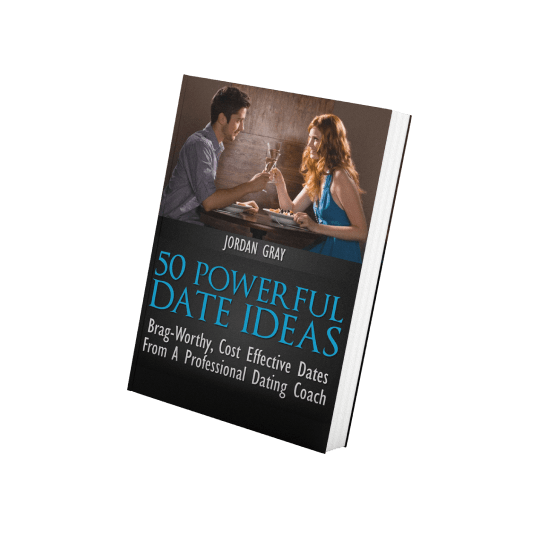One of the most common questions that I get on a weekly basis is…
“I’m in a new relationship and I feel a low level state of anxiety basically 24/7. Am I normal!? Will this ever end? Should I listen to my anxiety and run, or hunker down and stick it out?”
Many a new relationship has been sabotaged by the nagging feeling of anxiety.
And why is that? It’s simple. Entering a promising relationship, with real long-term potential can be anxiety producing.
Your ego starts thrashing about inside your head and saying things like:
“Remember all of those times that you got HURT!? We can’t repeat that again…”
“You’re too good for them! Look at all of these convincing ways that we can criticize them…”
“They’re too good for you! You know it and eventually they will figure it out. You better get out while you still can… the pain will be less devastating if you get out now.”
Basically, your ego specializes in two things: maintaining the status quo, and maintaining separation between you and others. And falling in love with someone is the ultimate dissolution (aka death) of your ego. It knows that it’s fighting a losing battle, and so it pulls out all of the stops to keep you from getting close to someone else.
And your ego doesn’t just throw a fit when you’re getting close to another person, but when you’re doing anything that marginally improves the quality of your life (starting a new business, changing your eating habits for the better, beginning any program that’s aim is spiritual development, claiming your desire for a new coach/therapist/mentor). But that’s a topic for another article.
So how do you keep your anxiety from ruining your new relationship?
How do you know whether your anxiety is highlighting a real threat or incompatibility versus simply a passing wave of emotion that will leave you alone in due time?
Here are five tools that you can use to help you navigate relationship anxiety. These tips work whether you are in a new relationship, or you’re deep into a relationship and questioning whether or not you should stay or go.
1. ‘What if’ vs. ‘What is’
One of the most common tools that I have my clients utilize when they’re getting wrapped up in their tangled web of anxiety is to check in on whether they’re using ‘What if?’ vs. ‘What is?’ thinking.
‘What if’ thinking always produces anxiety. It puts your mind in the future, and places you in a fear-based, invented place.
‘What is’ thinking brings you back to the present moment and allows you to see your situation (and your anxiety) for what is truly is.
More often than not with people who deal with anxiety, our minds are simply fountains of noise, spewing off endless fears that are ultimately unproductive. Or, as Mark Twain once said, “I’ve lived through some terrible things in my life. Some of which actually happened.”
But how do you know if your anxiety in the present moment IS about the reality of your situation?
2. Differentiating between guidance anxiety and sabotaging fear
Guidance anxiety is the anxiety that is active inside of you because it wants to tell you something real.
You have likely felt guidance anxiety if you’ve ever ignored your heart’s calling to pursue a specific person, career, or creative project. You may have also experienced guidance anxiety in a relationship when there actually was a core incompatibility between you and your significant other and your body told you to get out.
Sabotaging fear is the kind of anxiety that throws a temper tantrum for no discernible reason. When you engage this kind of anxiety in a dialogue (‘Hey anxiety, what’s up? Are you here to tell me something important? What am I missing?’) it’s response comes up short. If your mind has no real reason to be afraid of the person you’re in a relationship with and you enjoy a high degree of friendship compatibility and friendship compatibility, then you are likely being led by your ego which always wants to destroy connection at all costs.
But if you’re drowning in anxiety and it feels increasingly difficult to tell the difference between whether what you’re experiencing is guidance anxiety versus sabotaging fear, it might be time to get an outside perspective.
3. Do the friend check
If you can’t decide whether your anxiety is based in reality or not, our closest loved ones are often potent mirrors to help us gain some perspective.
Spend time with your partner with your friends/family members/closest loved ones around, and then have those loved ones reflect back to you what they see in your connection.
They might say, “Are you crazy!? You guys are adorable. You seem very yourself when you’re around them, they treat you well, and you spent the whole time laughing and cuddling. You seem very compatible. I approve!”
Or they might say, “They are a deadbeat, they were rude and disrespectful to you, and your lives are completely different. You are not imagining things. You should end this relationship.”

Your friend Susan approves – thanks Susan! Oh god… Susan. Susan watch out for that- … NOOO!!! Susan!!!!!
Whatever feedback your loved ones give you, you will gain further clarity and insight into your situation.
And while the feedback of one person shouldn’t necessarily make or break your relationship, if you see a pattern in the feedback (either positive or negative) that you receive, then it’s probably worth listening to.
4. Keep your favourite things about them front and centre
If your heart is leaning further and further in the direction of ‘This person is actually quite good for me and I’m just afraid of getting hurt/being seen fully/opening my heart to someone again’ then this tip will work wonders for you.
Just like I often advise people who are in on-again-off-again relationships to keep a list of things that they don’t like about their ex front and centre, when you’re trying to calm your anxiety in a relationship, it’s best to keep a list of positive things handy so that you’re reminded me of the reality of them often.
Maybe you love how driven they are. Or how insightful they are. Or how kind they are. Or how cute their nose is.
Whatever it is you adore about your significant other, simply place your list of positives on your cell phone’s wallpaper, or on a sticky note that you can stick on your bathroom mirror or computer so that you see them often.
5. Ask, ‘Does this person help me to be more myself or less?’
While any intimate relationship requires time, energy, attention, and effort to thrive, ultimately, the relationship that you’ll spend most of your life in is the one that helps you to be more you and feel more free.
Can you honestly answer the question, ‘Does this person help me to be more free in my life?’ in the affirmative? Then you are probably experiencing a healthy, resilient connection that you should invest in.
Conversely, if you feel trapped, limited, and out of alignment with who you truly are by engaging in your relationship, then it might not be the right thing to invest in.
Figure out what your core values are, remind yourself what your life is actually about, and then see if the person you’re dating is an aligned fit for what you know about yourself. Simple as that.
Dedicated to your success,
Jordan
Ps. If you’re struggling with relationship anxiety and need an outside perspective, I’m always available to hop on a call with you to help you gain a deeper sense of clarity and ease about your situation.
Pps. If you enjoyed reading this article, you might also love reading:
– 7 Simple Tips To Beat Anxiety Naturally
– How To Fully Release Difficult Emotions That Hold You Back







